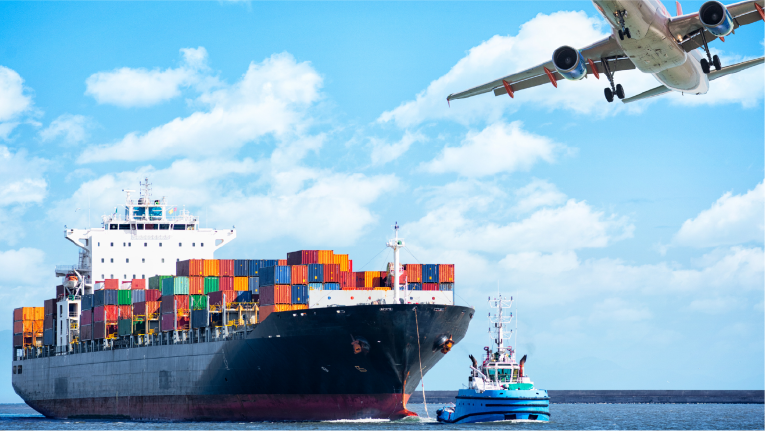Air freight vs Sea Freight

There are two options for businesses and individuals to transport their goods overseas. These two options for international freight are air and sea. Airfreight has in recent times become more popular in international freight shipping.
To ship internationally efficiently tends to require tremendous knowledge and experience. International logistics introduces a different set of rules, regulations and implemented practices. These make the transportation of goods even more challenging. As such, many factors must be considered for an individual or company when choosing which method in transportation they should use for their goods. Furthermore, this includes the cost, speed, reliability and in some cases even environmental impact.
Speed:
International air freight is considerably faster than its alternative, which is sea freight. Air freight is primarily used for instances that speed is the most important factor in the transportation process.
Sea freight transportation takes longer than airfreight as its speed is naturally much slower. In addition, vessels tend to have more stop overs and potentially require refuelling during transit to the final destination. Moreover, the average speed of sea freight movement is 2 weeks to 3 months, depending on the distance.
Cost:
The charges gained by either air or sea can vary greatly depending on the amount of weight for air freight and volume for sea freight that you are intending to transport. For heavier and bulkier cargo, it is often cheaper to ship by sea. However, when shipments are smaller, margins between the prices of sea freight and air freight reduces, resulting in air freight becoming less expensive and the more efficient method. Furthermore, depending on the agreed Incoterms between the shipper and importer; each party should also consider destination charges, where both methods of transportation will incur customs and destination fees.
Reliability:
Air transportation can be affected by bad weather, as well as other circumstances such as, strikes, that can result in delayed times. Although, air freight is one of the safest ways for international cargo transportation - It is fairly reliable especially if the air carrier has extensive operations and a large number of flights daily.
Whilst air transport is one of the safest ways to move cargo, Sea transportation is also relatively reliable. The vessels undergo inspections and confirmation on the condition of the vessel, if it is safe and in good condition to depart from the port. Most ships are designed to overcome difficult weather conditions, although more harsh weather may induce unforeseen delays. In addition, port congestions tend to become a big issue for sea transportation (especially during peak seasons each year).
Regardless of which method you choose, it would be wise to ask your international freight forwarder about insurance coverage for your own peace of mind.
Environmental Impact:
A report from the Guardian newspaper suggested that shipping creates 2.5 times the amount of emission that airplanes create, thus making air freight the more environmental option. This article by the Guardian doesn't count that although shipping does contribute more emissions than airplanes, they also carry much more cargo than planes can. Therefore, planes have to make additional trips or increase the number of planes used for transporting the same amount of cargo, in comparison to that of a vessel, which subsequently results in a less environmentally friendly option.
Limitations of Air and Sea Freight:
Although these methods are great to use, there are some limitations that come with each of them.
Air Freight:
- Airlines have stricter regulations when shipping hazardous materials.
- Hazardous materials includes gases (lamp bulbs), all things flammable (perfumes), toxic/corrosive substances (batteries), magnetic substances (speakers), public health risks (untanned hides), oxidisers/biomedical products (chemical medicines).
Sea Freight:
- Routes and timetables of sea freight are usually inflexible
- Basic freight rates are subject to fuel and currency surcharges
Sources:
www.freightos.com/freight-resources/air-freight-vs-ocean-freight-making-the-decision
www.globaltrademag.com/airfreight-vs-sea-freight-which-works-better
www.allworldlogistics.com.au/sea-freight-vs-air-freight


